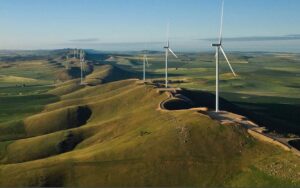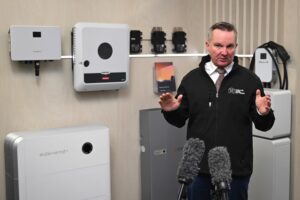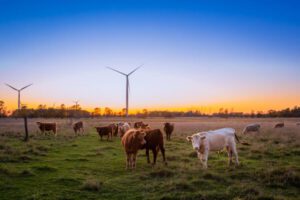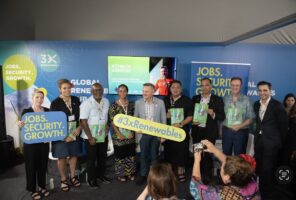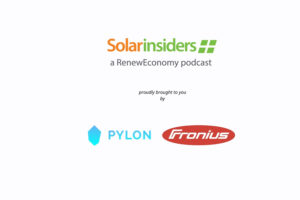Regardless of whether, or when, prime minister Scott Morrison finally commits Australia to a specific zero emissions target, global markets have already made up their mind, and money is already being moved. Trillions of dollars will follow.
Morrison’s offsider, federal treasurer Josh Frydenberg, gave a speech to the Australian Industry Group on Friday, that made clear that he, at least, sees global investment markets already operating on the basis that the world will move towards a zero-emissions goal.
Frydenberg said Australia had to accept that money is being moved into industries aligned with decarbonisation, or being risked viewed as a pariah by the owners of capital.
“The world signalled its ambition when more than 190 parties committed in Paris to keep the rise in average global temperatures to below two degrees,” Frydenberg said, referencing the Paris Agreement which included an ambition to limit warming to just 1.5 degrees.
“This is guiding the mobilisation of trillions of dollars in support of the transition.”
“We cannot run the risk that markets falsely assume we are not transitioning in line with the rest of the world. Were we to find ourselves in that position, it would increase the cost of capital and reduce its availability, be it debt or equity.”
Frydenberg is the latest in a flurry of federal Liberal caucus members who have spoken up about the need to come around on long-term commitments to act on climate change and ramp up reductions in Australia’s emissions.
Labor spokesperson for climate and energy, Chris Bowen, suggested it was a bit late for Frydenberg to come to the table with a commitment to a zero emissions target, given Frydenberg’s failure to achieve lasting policy change when he held the environment and energy portfolios.
“Josh Frydenberg has net zero credibility when it comes to climate change,” Bowen said. “He has too often had the chance to act and too often failed. This is a government which has left it too late, it’ll fall to an incoming Labor Government to take the opportunities, the economic opportunity, which is the world’s climate emergency.”
“If Scott Morrison and Josh Frydenberg really think that net zero is such a good idea, why don’t they get on and do it? I mean, enough speeches, enough sound grabs, enough positioning, change the policy of the country.”
But Frydenberg’s pitch received support from the Investor Group on Climate Change (IGCC), which represents a number of major Australian institutional investors that investors were already calling on governments to embrace zero emissions targets.
“If Australia wants to remain competitive in these markets, we need to look forward to the jobs, industries and infrastructure that will be competitive in a net zero world and relevant to our major trade partners who are rapidly seeking to decarbonise,” IGCC chief executive officer, Rebecca Mikula-Wight, said.
But she also pointed out that a net zero by 2050 is not enough. The UN, scientists, and global investors are calling for stronger targets to cut emissions within the next decade, which will count most.
“Over 70 per cent of Australia’s two-way trade is now with countries that have committed to net zero emission by or near mid-century,” Mikula-Wight added.
“Large numbers of institutional investors are rapidly committing to net zero emissions and setting 2025 and 2030 goals for their portfolios.”
“Australia’s 2030 emissions reduction target is now one of the weakest among comparable countries in the G20. An enhanced 2030 goal and a national commitment to net zero by 2050 are critical signals to global markets that Australia is keeping pace with the world.”
The IGCC said that projects like the Net Zero Asset Managers initiative has already seen commitments from more than a hundred signatories – managing combined assets of greater than $43 trillion – including the three largest fund managers in the world BlackRock, State Street and Vanguard.
On Friday, Morrison made clear that while the next round of international climate talks are just over a month away, he has yet to secure an agreement with his Coalition counterparts in the National party on a zero emissions target.
Morrison did meet with Indian prime minister Narendra Modi on Thursday, revealing that the two countries had agreed to cooperate on the development of low-cost solar technologies and the supply of hydrogen to India.
“One of the key points we continue to make about addressing climate change is to ensure that we get the technology transfer from developed to developing economies,” Morrison said.
“If we want to address climate change, then we need to address the change that is necessary in developing economies, so they can grow their economies, build their industries, make the things the world needs.”
It’s an insightful shift in the priorities for India’s relationship with Australia. We have been told for so long by members of the Morrison government that coal had to be a key focus of Australia’s energy exports to India, underpinning the case for Adani’s Carmichael coal mine.
So much of the Coalition’s rhetoric around Australia’s energy exports to India has sought to promote the ongoing use of coal the somewhat absurd notion that Australia is a “cleaner” source of the fossil fuel.
Morrison will meet with Modi, as well as Japanese prime minister Yoshihide Suga and US president Joe Biden over the weekend for a meeting of the ‘quad’ alliance – a forum that is also likely to discuss the four country’s commitments to climate and green investment.


